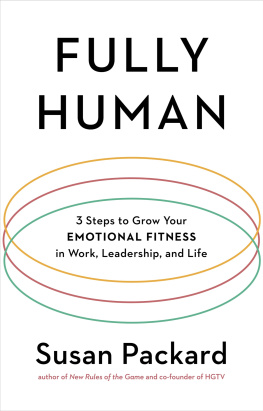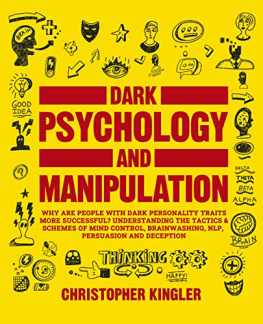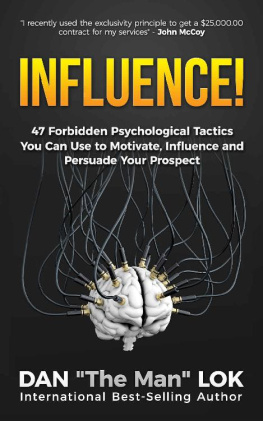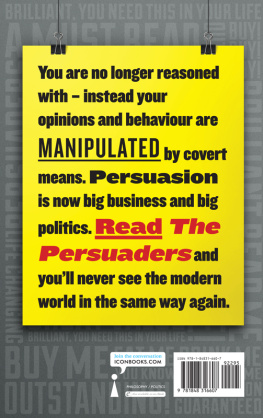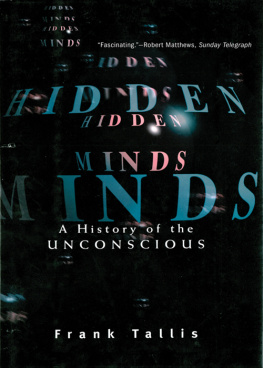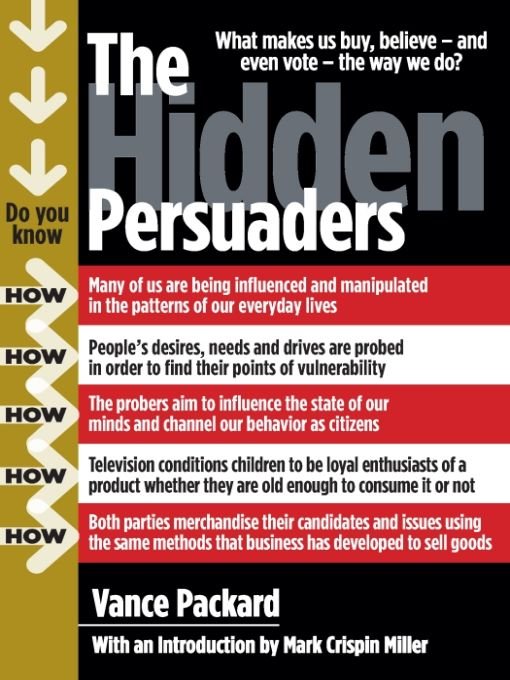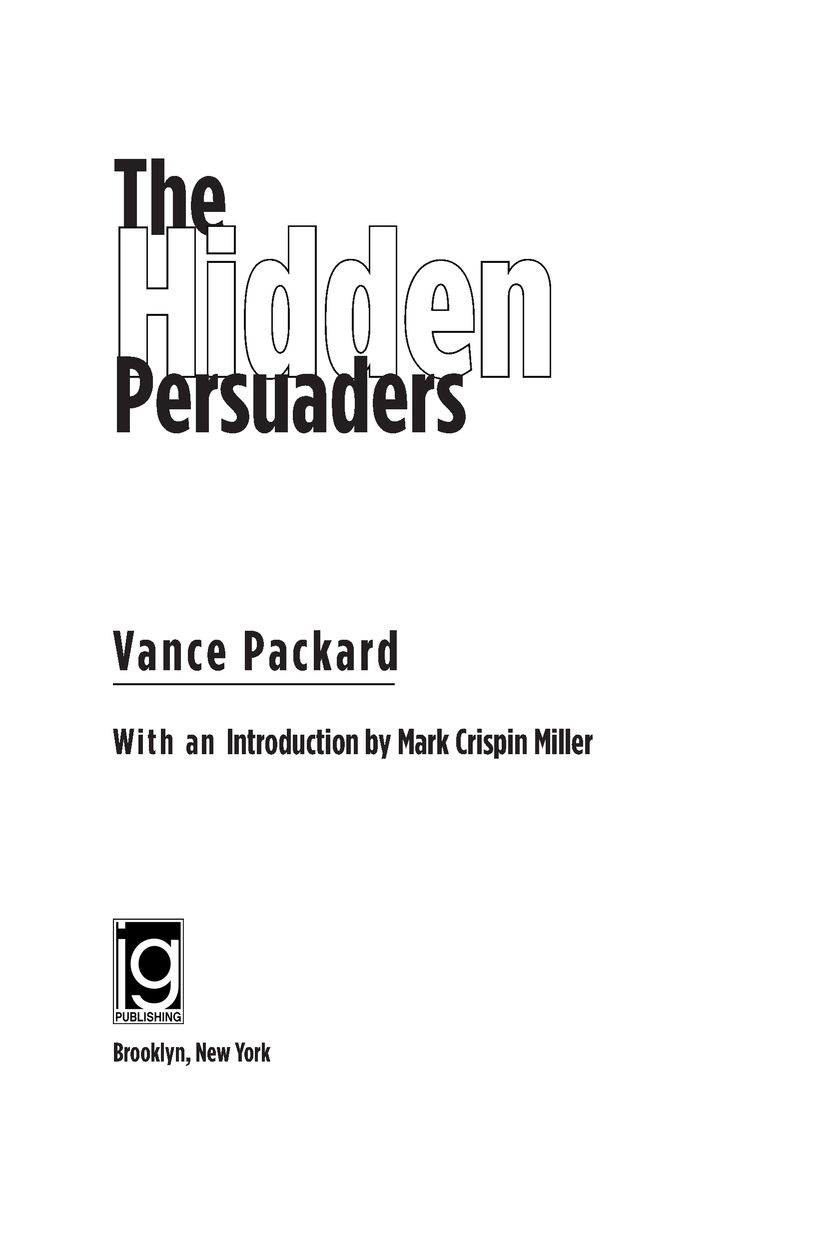Table of Contents
To Virginia
INTRODUCTION
by Mark Crispin Miller
I .
The history of America since the Civil War is, in large part, a history of conquest by commercial advertising. The decades have seen more and more of it, appearing in more places than it ever was before, with more and more of it more brilliantly designed, and more efficiently compressed, and more ingeniously disguised as something else. Thus more and more of it has passed into our hearts and minds without our seeing it or knowing it (a feature of the most effective propaganda); and its appeals and promises have been devised with ever more sophistication, and with ever greater subtlety implanted deep inside our heads. In short, the modern history of America is, in large part, the history of an ever-rising flood of corporate propagandaand also of our various responses to it, as We the People have obscurely struggled to reverse it, or resist it, or to live our lives in spite of it, or have simply let it carry us away.
For over a century, there have been many works diversely critical of that commercial tidebooks and articles and films assailing its unsightliness, intrusiveness, false claims, deceptive offers, moral crudeness, idiotic language, poisonous effects on public health, sly approaches to small children, non-stop sexist fantasy, casual racism, creed of selfishness and catastrophic impact on the worlds ecology, etc. It is a highly edifying literature; and yet very few of those quixotic works have moved the public. In 1927, crusading journalist Stuart Chase and engineer Frederick J. Schlink came out with Your Moneys Worth: A Study in the Waste of the Consumers Dollars, a powerful expos of the countless little frauds routinely perpetrated on Americans by corporate manufacturers, whose ads hid more than they revealed. (In 1925, Chase had taken aim directly at commercial advertising in his first book, Tragedy of Waste.) The book was a political sensation, starting a new chapter in the history of mass activism. The Uncle Toms Cabin of the consumer movement, as one admirer later put it, Chase and Schlinks book led to the founding, in 1929, of Consumer Research, Inc., the first group of its kind, and a crucial stimulus for later, bolder organizing.
And yet no popular critique of advertising moved the public, or changed their view of that essential corporate craft, as deeply or enduringly as Vance Packards The Hidden Persuaders. Although it had no obvious political effects (nor did its author call for any), this anomalous expos encouraged a new mass attentiveness to all of modern marketing, the ads includeda critical alertness, or heightened wariness, that is still perceptible (albeit less prevalent) today.
Not that advertising had been much esteemed or trusted prior to the publication of this book. From the Twenties, and especially since the Great Depression, Madison Avenue had been about as popular as smokers cough. What Packard did was educate, and thereby heighten, that common animus, by illuminating what he called the depth approach that had overtaken corporate marketing since World War II. Large-scale efforts are being made, often with impressive success, Packard notes, correctly, in his opening paragraph,
to channel our unthinking habits, our purchasing decisions, and our thought processes by the use of insights gleaned from psychiatry and the social sciences. Typically these efforts take place beneath our level of awareness; so that the appeals which move us are often, in a sense, hidden.
Although it had no obvious political effect, The Hidden Persuaders made a difference in the publics concept of commercial suasion. Formerlyi. e., from the Twenties into the mid-Fiftiesadvertising had been generally conceived as a coercive din, drummed up everywhere to browbeat, addle and/or mesmerize the masses into squandering their hard-earned wages on a lot of glittering junk. Such bunk or ballyhoo was the obvious and abrasive work of hucksters, high-paid bunko artists working in the circus mode of P.T. Barnum, and yet advantaged by a range of marvelous new propaganda mediafrom neon to rotogravure to radio to cinema, etc.that Barnum never had a chance to use. Thus, before the coming of Vance Packards expos, the public, insofar as they thought much about it, tended to see advertising as an endless con, all half-truths and hyperbole and outright lies. That casually cynical perception was reflected back in various satiric bits and censures in the post-war years: Cary Grant in Mr. Blandings Builds His Dream House, agonizing over copy for WHAM Ham (1948, based on Eric Hodgins novel of two years before); Lucy getting plastered doing several takes of a TV commercial for Vitameatavegamin, a bogus tonic spiked with alcohol (1952); Roy Norrs Cancer by the Carton, the famous article assailing the tobacco companies for glamorizing toxic wares (which Readers Digest published twice in 1952); and so on.
As Hodgins (gentle) barb makes clear, it was not just the public that saw advertising as an overload of bunk. Many in the advertising industry also regarded their profession as a giant rip-off. Hence the definitive self-contempt of such literary heroes as Mr. Blandings, who, as one of many hard-working, highly competent, deeply miserable men who wrote advertising copy, Hodgins writes, loathed his calling with a deep, passionate intensity. (Having labored as a writer at, editor for, and publisher of Fortune, Hodgins had known many ad men.) What made that sort of work despicable, especially for anyone with democratic notions, was its treatment of Americans en masse according to the mechanistic tenets of old-fashioned crowd psychologyan angry inside view that would from time to time receive a national hearing.
Remember, two things make good advertising, counsels Evan Evans, the monstrous hand-soap magnate in
The Hucksters, Frederic Wakemans best-selling novel of 1946 (and the basis of a Clark Gable vehicle released by MGM in 1947)
One, a good simple idea. Two, repetition. And by repetition, by God, I mean until the public is so irritated with it, theyll buy your brand because they bloody well cant forget it. All you professional advertising men are scared the death of raping the public; I say the public likes it, if you got the know-how to make em relax and enjoy it.
Although Evans is a loathsome characterbased on George Washington Hill, the bullying, amoral founder/president of American Tobaccohis crude take on advertising is, unfortunately, on the money (so to speak), as Vic Norman, the novels hero, fully understands. Based on, and speaking for, the novels authorwho had worked for several years at Foote, Cone & Belding in New YorkNorman ends up telling Evans off and moving on to less degraded, less degrading labor.
All such satire and polemic, even at its most indignant, greatly understated the threat posed by advertising, particularly since the war; for those responses all cast advertising as overt solicitation: easy to perceive and, therefore, easy to resist, if you just keep your wits about you and deploy your common sense. Anyone thus armed will not be moved by the false promises of advertising, nor led into temptation by its other blatant stimuli, however expertly concocted they may be: the motto that you cant forget, the jingle that wont leave your head, or the endless hints that youre too fat or scrawny, pale or pimply, vulgar, flakey-headed, dull or stinky, or just ludicrously out-of-date. As advertising is, in short, a vast unwanted overture, those who always try to see it coming will see through it every time, because its many faultsits triviality, its foolishness, its wild hyperbole, and even its incessant bald-faced liesare all


